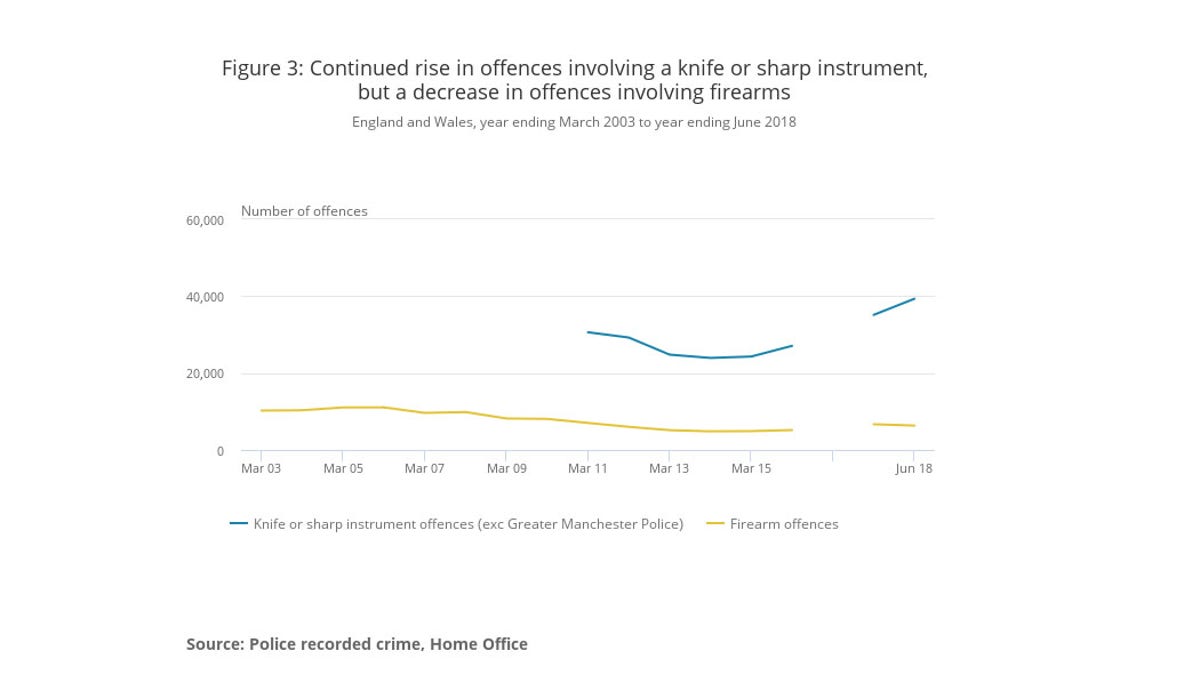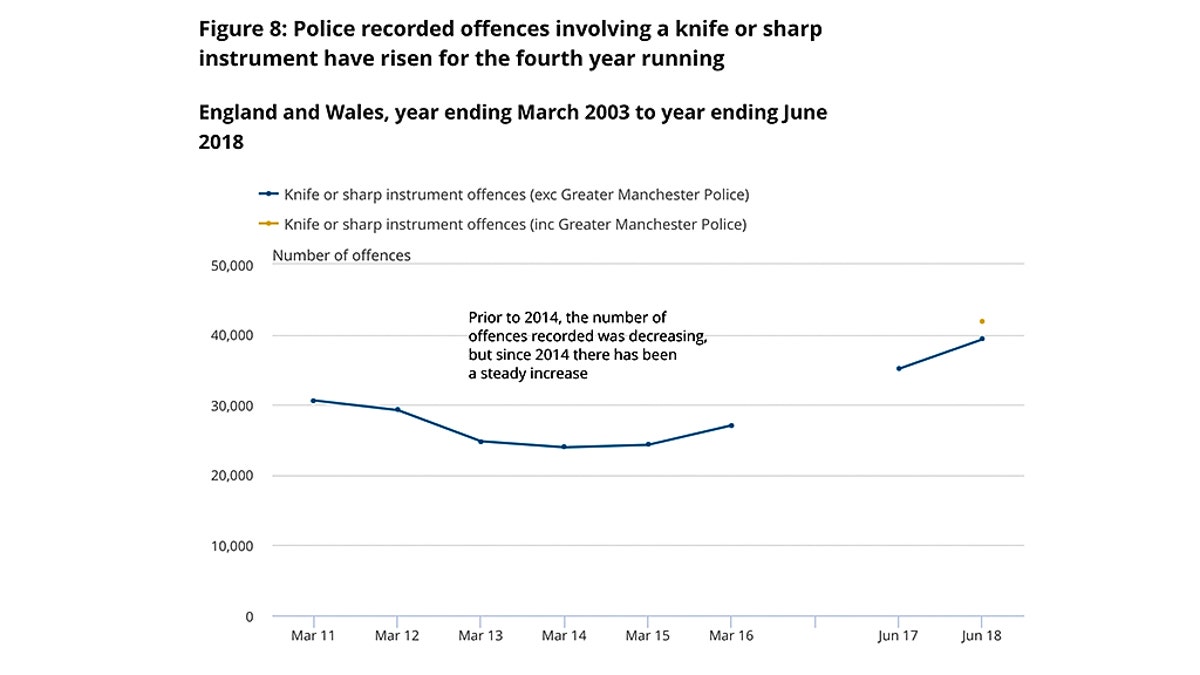
Police in the United Kingdom has reported that in the first six months of the year there were 39,332 knife crime attacks. (istock)
On Wednesday, London police responded to separate stabbings within hours of each other, the victims, a young boy believed to be in his teens and a man, were sent to the hospital with life-threatening or serious stab wounds.
That makes two attacks this morning, five this week...and more than 39,000 in just six months.
Quietly, a brutal, deadly knife attack epidemic is overwhelming residents and police forces throughout the United Kingdom.
Of the five people stabbed this week, the youngest was 15-year-old Jay Hughes, who was attacked outside a chicken shop in broad daylight.
During the first six months of the year, police recorded 39,332 knife crime offenses -- a 12 percent increase over last year, according to the Office for National Statistics. Other violent crimes, including murder and robbery, also increased by double-digit percentages.

Data also showed the number of homicides in which a knife or sharp instrument was used increased by 25 percent in the last year, ONS said.
There's little agreement about what's behind the surge in violent crime. Some point fingers at gangs and the sale of drugs; others blame recent mass migration -- with little or no vetting and few resources with which to care for the new populations -- that poured in from the Middle East, largely as a result of fighting in Syria; Yet another theory is that police resources are stretched due to a plummeting number of officers.
Embattled London Mayor Sadiq Khan warned Monday it could take a generation to solve London’s violent crime problem.
Elsewhere, Home Secretary Sajid Javid reportedly called London’s police commissioner demanding officers step up the response and get “the situation under control.”
“I want to make sure that police have the powers they need and the tools,” Javid told The Daily Telegraph, adding he wants to sweep away bureaucracy and enhance police officer’s ability to employ “stop and search” – the British version of the controversial “stop and frisk” tactic used in the United States.
Javid said police have done “a very good job” in combating the rising crime rate, but “there’s more we can do to help.”
UK LAWMAKER ON LONDON’S MURDER SURGE: ‘ENOUGH IS ENOUGH’
The ONS said in its report last month that, while knife crime was “concentrated in London and other metropolitan areas,” the majority of police forces across the United Kingdom also saw a rise to some degree.

The true tally of knife crimes is likely even higher than ONS' figure, given Greater Manchester Police data was excluded by ONS because a review of its figures found they undercounting offenses. If those figures were included, the total of knife or sharp instrument offenses across the U.K. would climb to 41,884.
Richard Walton, the former head of the Metropolitan Police’s counter-terrorism command, warned that police are on the cusp of losing control of the streets to violent criminals.
“Violence is indeed infectious but there is very little in place in our communities across the country now to stop it from spreading,” he wrote in an article for The Telegraph. “It is ironic that at a time when policing leadership and culture is widely viewed as strong and reformed, policing is now simply holding the thin blue line, responding to crises and reacting to escalating levels of violence.”
LONDON MURDER RATE BEATS NEW YORK FOR MONTH AS STABBINGS SURGE
The government has denied any causal link between cuts to the police force and the increase in stabbings – instead claiming changes in the drug market and social media incitement were key drivers of violence, The Independent reported.

Police officers and security watch as people re-enter a building after a stabbing incident in central London, Friday, Nov. 2, 2018. British police say two people have been stabbed and a man has been arrested at an address in central London that is home to the offices of Sony Music. (AP Photo/Alastair Grant)
Experts say what's unmistakable is that the victims and assailants in these crimes are growing younger. And doctors are also reporting an increase in the severity of the attacks, with many victims arriving at the hospital with multiple puncture wounds.
“Previously we used to see one or two wounds per victim. Now we are frequently seeing multiple wounds, five or sometimes 10 stab injuries on a single patient,” trauma and vascular surgeon Dr. Ross Davenport told The Guardian in August.
Cressida Dick, the commissioner of the Metropolitan Police in London, told The Independent young people carrying knives are turning what once would have been an after-school fist fight into murder.
“Some young people are carrying a knife because they feel frightened of other young people, and then when they are angry or feel threatened they use the knife,” she said.
In a commentary for the Evening Standard published Thursday, Dick said ending violence is her top priority.
“The causes of the rise in violence are complex, and so are the solutions, but each and every one of my officers and staff, whether they are a firearms officer, a neighborhood officer or a call handler, know violence is our number-one priority and have this at the forefront of their minds whatever they are doing,” she wrote.
She added: “Our work will continue, we will not stop or give up. Policing may be under-resourced, but we are using our officers carefully.”
